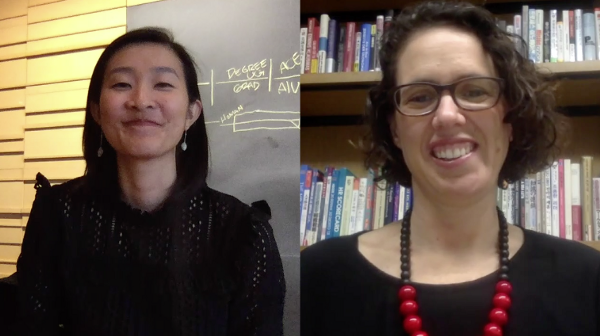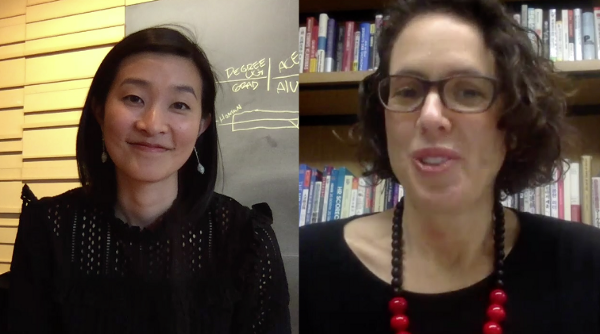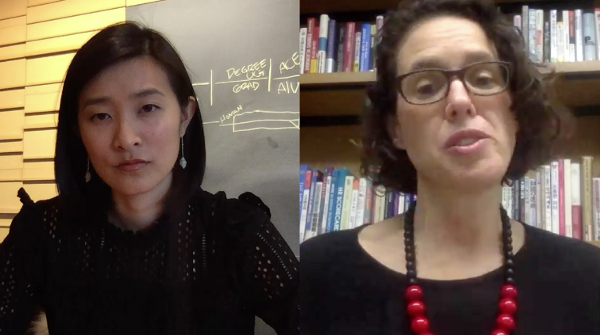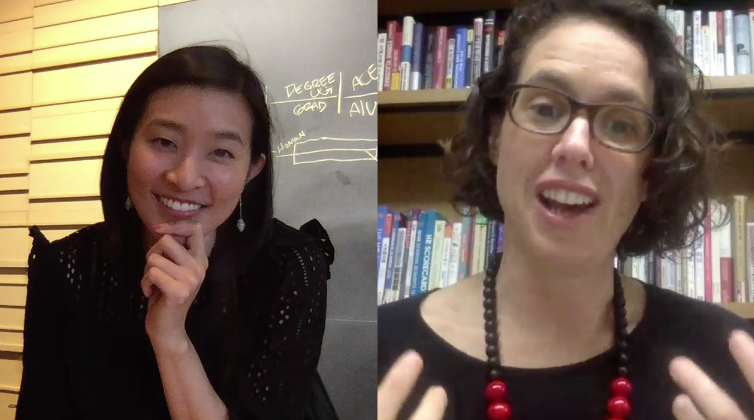As a prominent expert who wrote the book on workplace conflict (literally), Amy shares her biggest leadership lessons learned on healthy work relationships and working with conflict.
Amy Gallo is a Contributing Editor at Harvard Business
Claire Lew: Hi, everyone. My name is Claire Lew, and I’m the CEO of Know Your Company. Today, I have a really special guest with me. I have Amy Gallo, who is the Contributing Editor for Harvard Business Review, which, let’s admit it, all of us, including myself, read all the time hoping to become a better leader. It’s where I, personally, have learned a lot.
Amy, in particular, is an absolute expert on conflict management and resolution. She’s actually written the HBR Guide to Dealing with Conflict. I actually have it, and I highly recommend you pick it up if you don’t. It’s a real honor and treat to have Amy here today, and I’m gonna ask her this one question about leadership.
Amy Gallo: I’m ready. Thanks for having me, Claire.
Claire: Absolutely. Amy, my question for you that I’ve been asking folks, is what’s something you wish you would’ve learned earlier as a leader?

Amy: I have two things that I wanted to share. One of which is, first, the thing I really didn’t know early in my career, which I’ve learned over time, is the importance of relationships at work. I think I came into organizations and business … I was a management consultant earlier in my career, and I really felt I had my friends and I have people I work with. I was always very boundaried about who I spent time with. I thought work isn’t personal, keep the focus on business, and yet I was also feeling a lot of caring feelings for the people who I worked with. I started to be, like, “These are people I wanna hang out with more.” I really wasn’t sure how to navigate all that.
I think I wish knew earlier the importance that co-workers as friends in your life, both from just making you feel supported and making work feel fun and exciting, but also from a performance perspective.
These networks that we build, these genuine relationships we build, are incredibly important to our performance and how we get work done. I mean not in a mercenary, I’ll scratch your back, you scratch my back way, but it’s how we gather information. It’s how different parts of the organization work. It’s how we make sense of the work that we need to do. It also gives us some meaning in the work we do. It’s much more fun for me to write an article for an editor that I consider a friend than an editor who I just consider a straight-up co-worker. It gives meat to the work, so I wish I had known early on how important those relationships were and how much effort they took and how it could have been a real conscious decision to build and foster those relationships earlier on.
Claire: Definitely. I know you have a second one, too, so I wanna get to the second thing you wish you would have learned earlier. But I find that so interesting, Amy, because I think a lot of times as leaders … In fact, I remember having a very specific conversation with a friend of mine who’s a CEO, and she said, “Claire, it’s so weird.” She’s like, “I can’t just get beers with my employees after work. It’s different.” And she’s, like, “I don’t really know how to navigate this sort of new place that I’m in as the CEO and as the co-owner of the business.”
So I’m curious… What do you think for you and for others first causes that resistance as a leader to wanting to establish those relationships? Why do we sort of pull back?
Amy: I think there’s a couple of things.
There are risks, of course, to having relationships at work. There’s a risk that you will overstep boundaries. There’s a risk that your friendship won’t work out and it’ll affect your work. There’s a risk that something will happen with the work that will affect your friendship. I think, especially as a leader, being friends with the people you manage can be really challenging.
You have a lot of control over their well-being, over their ability to make a living, everything from where they take a vacation to what kind of projects they get, when they can leave the office during the day. You make a lot of decisions for these people and when you’re a friend, I think you worry that your judgment is going to be clouded.
My argument for why you should get over those risks is that you’re going to care about these people, whether you try to put up those boundaries or not. It’s very possible to have friendships with whom you have boundaries. Even in personal relationships, you have boundaries. It’s not seventh grade anymore. You’re not spending time on the phone with them from 6:00 at night till 2:00 in the morning … for you, boundaries that speak for that situation. You have to do the same with your co-workers and your work friends. You set up the boundaries that are appropriate for the situation, but you still have to care about one another, or I should say, you’re going to care about another if you spend that much time together.
If you’re doing the work that’s meaningful to you, you’re gonna bring yourself to that work, and it’s counterproductive to try to say, “Oh, no, I can’t have relationships.”
Claire: Yeah. I think it’s such a good point … this idea of boundaries and care, and boundaries and relationships, and boundaries and friendship. They’re not mutually exclusive. It’s not either/or. You can have both. To your point about it being counterproductive to resist relationships: Can you tell me how this might play out in terms of … Your expertise is around conflict, so if a leader sort of resists wanting to create these relationships, how does that manifest when you have to have a difficult conversation or people aren’t getting along or you need to make a really big decision? I’m curious on your thoughts on that.

Amy: Sure. There’s two things when you think about relationships at work. They’re really built on trust and there are a lot of experts who talk about the different components of trust. Amy Cuddy, for example, talks about being warm and you need to be confident, and that’s what’s gonna make someone who works for you trust you. Now that warmth doesn’t necessarily have to be, “Hey, let’s go get a beer,” but you have to convey that you care about them, that you have their best interests at heart.
Again, it may not be the same friendship you have with someone you’ve known since college or someone who you know outside work, but it’s still a friendship. There’s still some caring going on there. You just have to be able to navigate, “Okay, now I’m gonna have these difficult conversations.” The way that benefits you is that really, what I’ve seen in my research on conflict, conflict resolution goes much better when both parties give each other the benefit of the doubt.
You’re much more likely to give someone the benefit of the doubt if you believe they care about you and have your best interests at heart.
Claire: Yes. That’s awesome.
Amy: If you really want someone … if you want someone who works for you to hear your difficult feedback, be willing to take a tough performance review well, be able to hear some news that’s not so great about the decision someone higher up in the organization made, or even you made as the CEO, showing them that you care about them and you considered that in your decision is incredibly important.
Claire: Absolutely. I think that is an amazing insight you wanna write down. I’ll probably re-watch this video and go, “Oh, that was so smart,” which is this idea that the conflict is often rooted in when we don’t give the person the benefit of the doubt. Having empathy, creating that trust, being somewhat of a friend to a person, helps give that benefit of the doubt. I think that’s brilliant and I’m tucking that away in my head, for sure.
Amy, what’s the second thing that you wish you would have learned earlier, as a leader?
Amy: Sure. As a conflict expert, you won’t be surprised it has to do with conflict, which is that I wish I had learned to disagree with my co-workers, with people who work for me, with people who work above me, earlier. I had an experience early in my career as a management consultant. I had a client who I thought as a really difficult person. In reality, I just didn’t agree with her and I didn’t know how to express that. I did a bunch of passive-aggressive things that weren’t really productive. When she finally found out how much I disagreed … Unfortunately, I sent her an email that I had meant to send to a colleague about everything I thought she was doing wrong —
Claire: Oh, my God.
Amy: … which was mortifying. It’s that moment you hit send, and I thought, “Oh, my gosh. I’ve just lost this client for our company. I’m probably gonna be fired.” My boss at the time advised to apologize, and I went to talk to her. She said, “Why didn’t you tell me this before?” I realized at that moment, she wanted me to disagree with her. That’s why she’s hired my company is to give her good advice and that requires disagreeing.
I think we’ve gotten to a place in so many organizations, and certainly in the U.S., in terms on the political level, where we just look for people who are gonna agree with us, and if we disagree, not doing right by the people we work with, by the clients we serve and certainly by our organization.
Disagreements are a central part of interacting with human beings and it’s a central part of doing good work. If you don’t have the skills and the courage to do that, you’re not doing your job, basically.
Claire: Absolutely. I think that is … I’m almost at a loss for words ’cause I couldn’t agree more that if we don’t disagree as humans, like you said, we’re not almost doing our jobs, and it is, to your point, such an essential part of how we interact. I feel like for … Sometimes, and maybe this is a question to ask you … I sometimes think about why have we gotten to this place, whether it is in politics, whether it is companies or even in relationships, family, otherwise, where we see conflict as bad? What in our heads has caused that to be the case? Is it biological? Is it sort of social, different things in the environment that have happened?

Amy: Yeah. You’re right. We’ve come to equate any sort of disagreement with being unkind, which is just simply not true. Often, if you disagree thoughtfully, it can often be the kind thing to do, especially in a work environment. Why we’ve got to this place … What I observe is that we tend to be really conflict-avoidant. It’s understandable. Conflict is uncomfortable. Having someone disagree with you can feel like a threat, right?
Claire: Yes, yes.
Amy: If you and I don’t see eye-to-eye on the project plan, I start the question, “Am I gonna get the resources I need? Does she think I’m good at my job? Am I gonna lose my job? Is my identity too wrapped up in this project plan?” It becomes a threat to a lot of things I hold dear, so then our bodies respond with the stress response of when we feel threatened. Disagreeing over the project plan is different than being caught in the middle of a hurricane, and yet our bodies respond similarly. We have to figure out how to notice the difference between, “This is a minor threat and the disagreement isn’t necessarily gonna hurt our relationship, our job, the project plan,” whatever it is, and get over that.
To be fair, I’m watching you listen to me and you’re nodding, and it feels great. We all love to be agreed with.
Claire: I’m agreeing with you.
Amy: Exactly. I’m like, “Yes, Claire thinks I’m right.” That feels so good. We’re all looking for that endorsement and that validation, but if we constantly seek that approval, which is readily available to us, especially. We’re all going after the likes. We’re all going after the shares. I think it just feeds that desire and we’re not willing to be uncomfortable any longer.
Claire: I know. Maybe I should be doing this while you’re talking and promoting the idea of disagreement more, and productive disagreement. “No, I disagree with you, Amy.” So much of what you’ve touched on is fascinating. One thing that particularly sort of piqued my interest is this idea of disagreeing kindly or that disagreeing with someone can be the kind thing to do. Tell me about that…
How do you do that? Because it doesn’t always feel like the kind thing to do. Sometimes I’ve been in a situation where I feel like I’m calling out a team member. I feel like I have to tell someone who is typically performing really well, “Hey, you’re not doing this right,” or, “This came totally out of left field.” Those are hard conversations to have, or, “I disagree with the direction you’re taking this project.” You don’t wanna have the employee leave or get mad at you or be bitter.
So how do you disagree kindly?

Amy: A couple of things. One, I would say, put yourself in the other person’s shoes. If you and I were working together and you had to give me negative feedback, I want that feedback.
Most of us want to know how we’re performing. If you look all the studies of employees show that they don’t feel like they get enough feedback, both critical and positive. Put yourself in their shoes. Oftentimes, we’re projecting our own discomfort when we’re unwilling to disagree, when the other person actually wants to hear what you have to say.
Certainly my client, in the story I shared before, wanted to know what I thought about our project. I unfortunately withheld sharing it.
That’s one thing. The other is, I think, try to separate the personal from the content of the disagreement. Most often at work, we’re disagreeing about an objective or goal of a project, or a process, how we’re gonna make the decision. We quickly associate that with our relationship. “If she disagrees with the project, she must not think I’m good at my job,” or, “She must think I’m not capable.” So try to really separate and what you can say to someone when you start to disagree, “This is about our work and our work relationship. I really enjoy working with you. I think you’re smart and capable. I wanna share a difference of opinion about X.” It’s really a disagreement about our tasks — really distinguishing the differences.
Also, disagree in a way that engages the other person. What negotiation experts say… You’re on opposite sides of the table butting heads, but you put the person on the same side of the table as you. “Hey, we have a problem we need to solve together. We’re not eye-to-eye on how to do that. Let’s put our heads together and find a new solution that works for everyone.”
That’s really collaborative language that’s kind and thoughtful, but I think it’s really helpful to making disagreement more palatable for people.
Claire: Absolutely.
Amy: Another quick tip is to ask for permission. If I’m in a meeting and I’m sharing my project plan and someone just says, “That’s never gonna work.” That, to me, totally blindsided me. My stress response kicks in. It feels horrible, but if someone says, “Hey, can I ask a question?” or, “Mind if I just express a different opinion about this?” That gives me that moment to say, “Okay, this is not gonna go the way I thought it was,” allows me to reset and puts me in a receptive mood, so I’m now ready to hear what that person has to say. Oftentimes, just asking permission gives that person a little break to switch their mentality so that they’re more open to hearing your disagreement.
Claire: Absolutely. I think so much of the other person on the other side of that conversation, who you’re disagreeing with, making sure that they’re in that receptive mode is so key. Because how many of us, very personally speaking, if I’m in a bad mood, if I’m stressed about something, if I’m busy and you ask me something or you disagree, chances are I’m not gonna be as open to hearing that, naturally. Versus if I’m feeling really good about something or I’m relaxed or I don’t really have a lot going on in my head. I think that’s such a key point… We can purposely, as leaders, sort of create that environment for our employees and make sure they’re in receptive modes instead of just sort of barraging people and saying, “Oh, I disagree,” or, “Oh, I think that’s a bad idea,” or, “Why’d you do it that way?” I think that’s so smart, Amy.
Amy: Yeah. Thank you.
Claire: Thank you so much for all of your wisdom today. I’m glad this is on video, because I’ll be taking notes. I’m sure a lot of the folks watching learned so much from you, as well. Thanks again.
Amy: Thank you, too. I actually enjoyed it.
Claire: Awesome.
